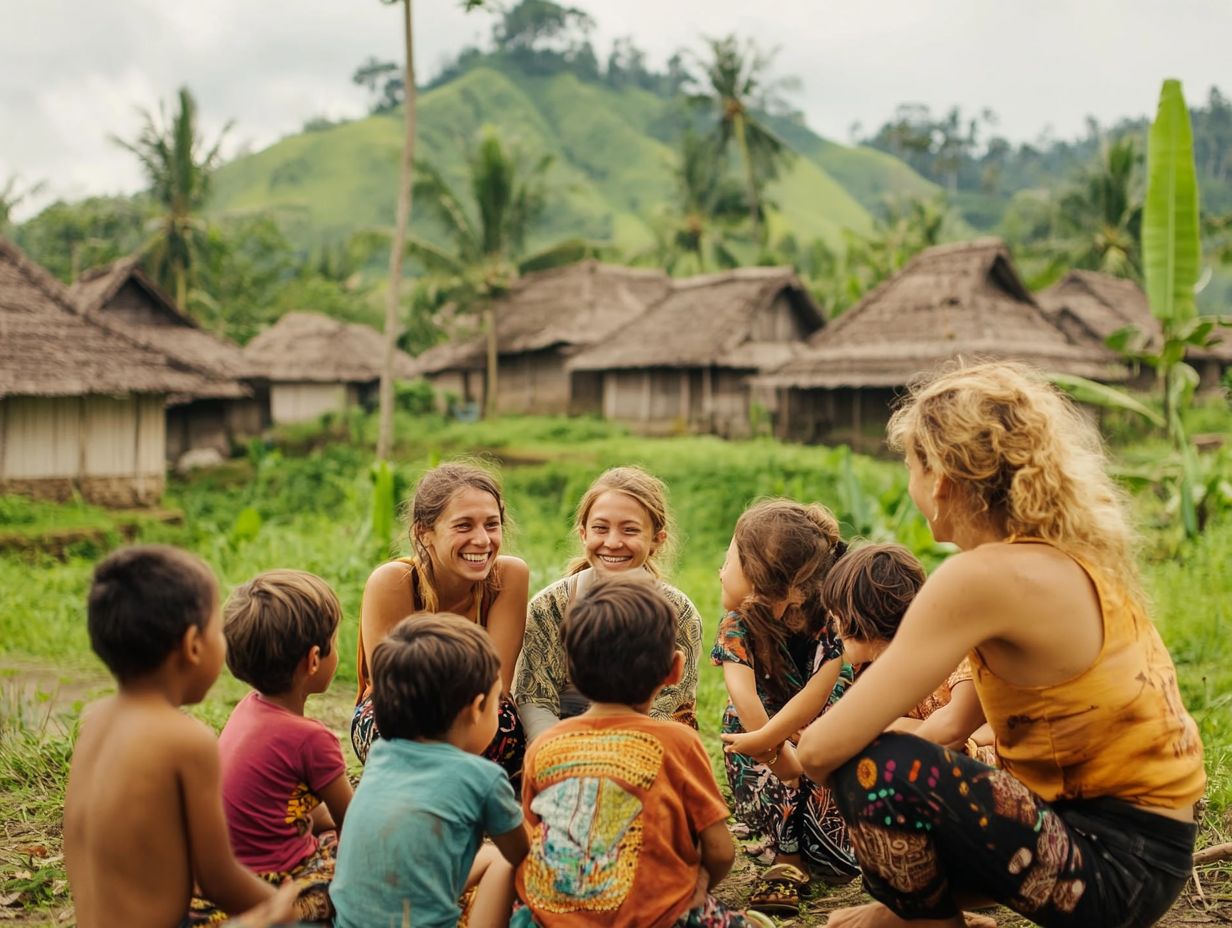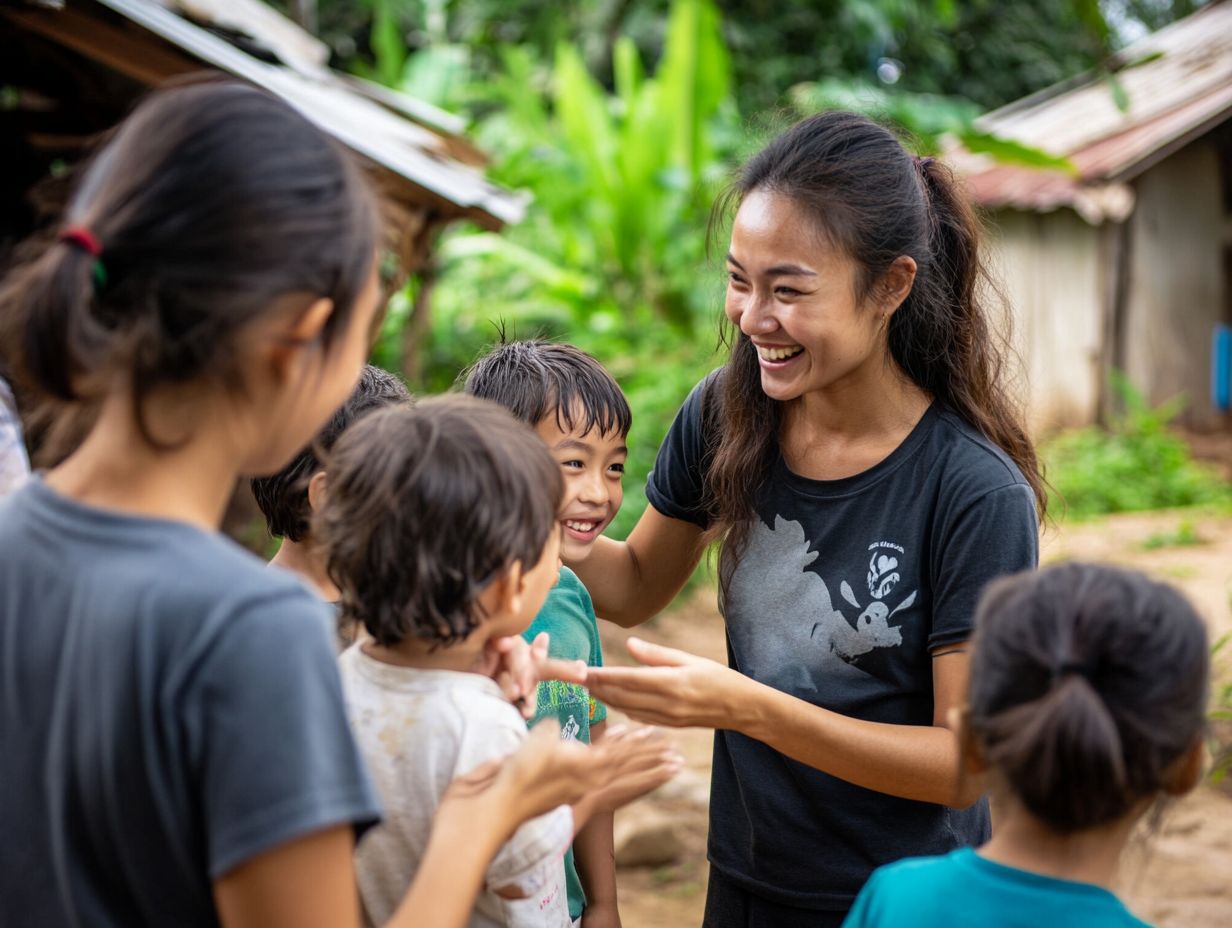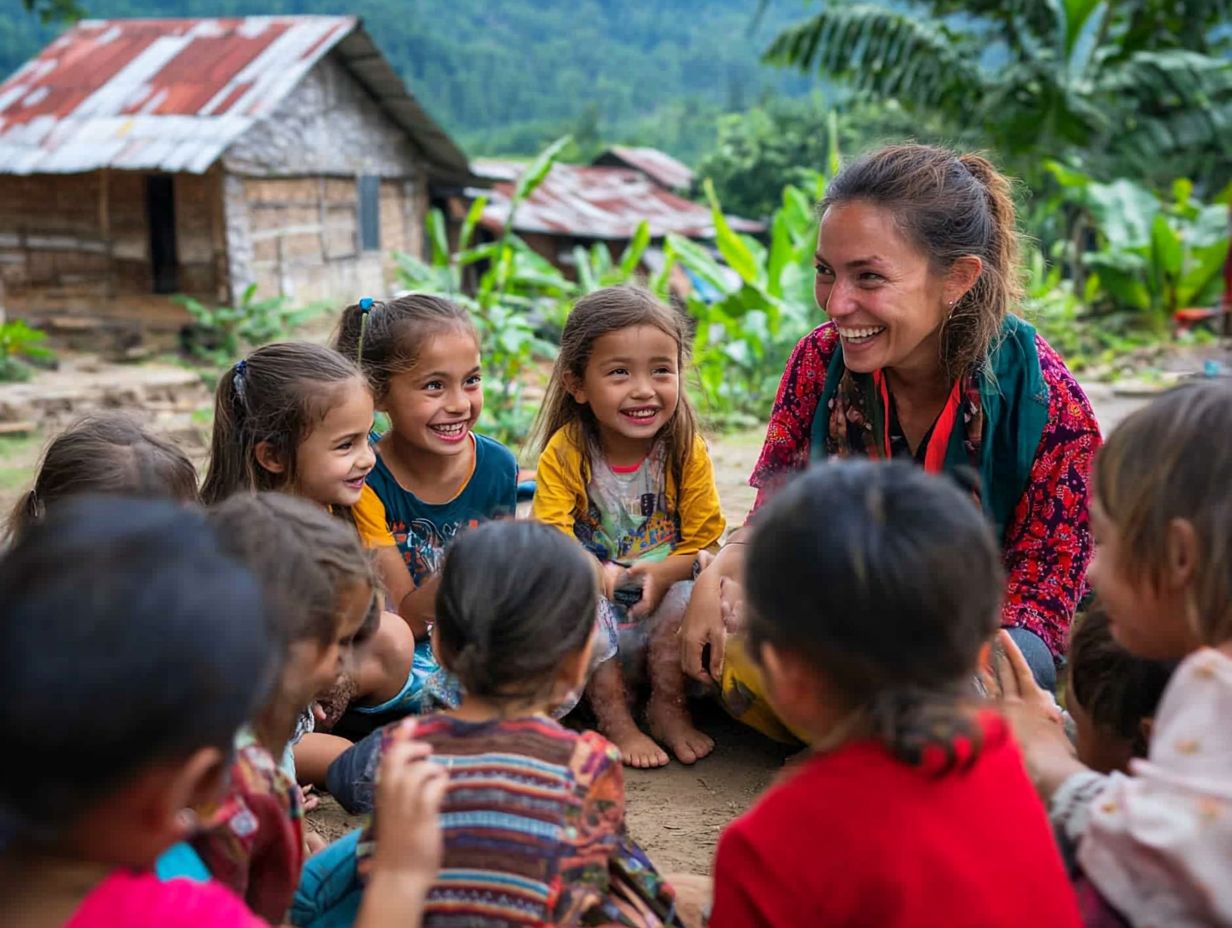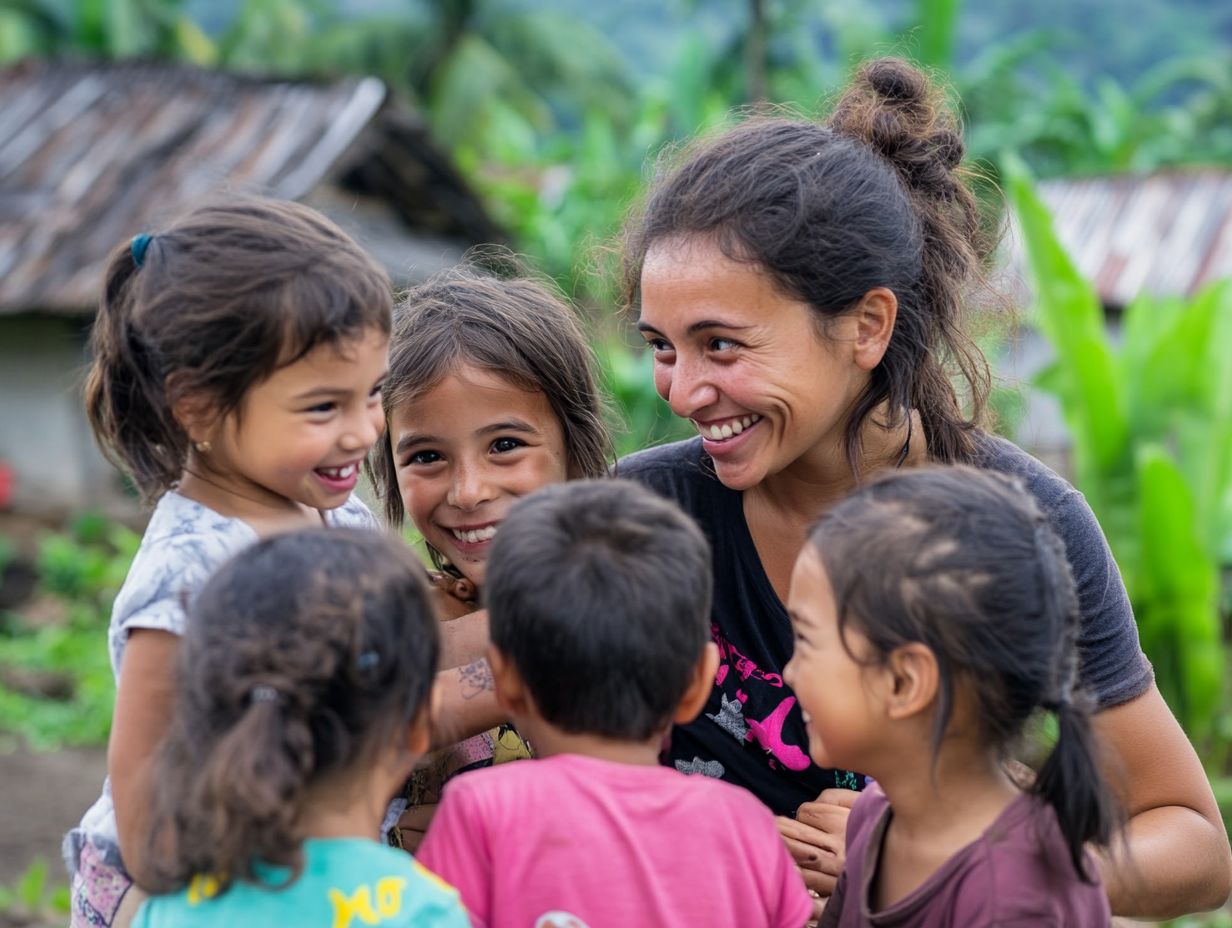The Ethics of Volunteer Travel: What to Know
Volunteer travel presents you with a remarkable opportunity to immerse yourself in new cultures while making a genuine impact on local communities in need through various volunteer opportunities.
Get ready to dive into the essentials of volunteer travel! This guide will help you define its purpose and understand its myriad benefits, including ethical volunteering considerations. You ll explore important ethical aspects and learn how to select the program that best suits your aspirations.
This guide also provides useful tips for preparing for your journey and reflecting on your travel experience to foster lasting change in community development.
Start your journey today and discover how you can travel with purpose and make a difference!
Contents
- Key Takeaways:
- Unlocking the Power of Volunteer Travel
- The Benefits of Volunteer Travel
- Ethical Considerations for Volunteer Travel
- Choosing a Volunteer Program
- Factors to Consider and Questions to Ask
- Preparing for Volunteer Travel
- Logistical and Cultural Preparation
- Reflection and Continued Impact
- Frequently Asked Questions
- What is volunteer travel?
- What are the ethics of volunteer travel?
- Why is it important to be aware of the ethics of volunteer travel?
- What are some ethical considerations to keep in mind while volunteering abroad?
- What are some red flags when choosing a volunteer program?
- How can I ensure my volunteer travel is ethical and responsible?
Key Takeaways:

- Volunteer travel is a form of tourism that involves participating in various volunteer projects or programs to benefit a specific community or cause.
- Volunteer travel has the potential to create personal and social impact, but it is important to also consider volunteer ethics and ensure responsible practices.
- When choosing a volunteer program, consider factors such as the placement company’s credibility, the organization’s mission, project sustainability, and community involvement. Prepare logistically and culturally before traveling, utilizing volunteer resources, and reflect on ways to continue making a positive impact even after the trip.
Unlocking the Power of Volunteer Travel
Understanding volunteer travel means looking into a transformative journey that beautifully intertwines volunteering, helping others, and cultural enrichment. As a volunteer traveler, you engage in diverse international volunteering opportunities designed to support community development while sharing cultures.
This unique experience elevates global volunteering. It also builds meaningful connections between volunteers and local communities through service. In doing so, you play a vital role in contributing to sustainable development through various volunteer projects.
Defining Volunteer Travel and Its Purpose
Volunteer travel is an enriching practice that invites you to journey to various locations, immersing yourself in meaningful volunteer work while promoting tourism that benefits both you and local communities.
This distinctive approach allows you to lend a helping hand and offers a rich, immersive experience that traditional tourism often overlooks, enhancing your volunteering experience. Unlike an ordinary vacation focused on relaxation and sightseeing, volunteer travel encourages you to forge a deeper connection with local cultures and tackle pressing social issues, including education, healthcare, and environmental conservation, through various nonprofit organizations.
By aligning your skills and passions with the needs of the community through effective volunteering programs, you often return from this journey with profound personal growth and a renewed sense of purpose. It s a rewarding endeavor that enriches not only your life but also the lives of those you assist.
The Benefits of Volunteer Travel
The benefits of volunteer travel reach far beyond the immediate effects on local communities and include personal transformation and global volunteering. Engaging in these meaningful experiences offers you profound personal and social rewards, facilitating your growth as a volunteer traveler.
You’ll have the opportunity to cultivate new skills while actively contributing to community-driven projects spearheaded by reputable volunteer organizations, enhancing your volunteer support.
Personal and Social Impact
Volunteer travel profoundly shapes your personal growth and the social dynamics of the communities you engage with. It enhances community involvement through various volunteer experiences while crafting memorable moments for everyone involved.
While volunteering, you will face new challenges that broaden your perspective. You’ll gain insights into different cultures and build skills like empathy and adaptability through responsible volunteering. The act of giving back fosters a sense of belonging and nurtures leadership qualities that enable you to contribute meaningfully to humanitarian aid initiatives.
Host communities benefit from fresh ideas and resources as committed volunteers like you engage in impactful conservation projects addressing local needs. This reciprocal exchange creates a rich tapestry of shared learning and volunteer impact, ultimately strengthening both your personal development and the social infrastructure of the communities you serve.
Ethical Considerations for Volunteer Travel

Ethical considerations in volunteer travel are crucial for ensuring that your efforts truly support sustainable development. It s essential to address the community’s needs without fostering relying on outside help instead of building local resources through careful volunteer planning.
Think carefully about your motivations and the ethical dimensions of volunteering. Embrace responsible practices that positively affect both the community and your experience.
Ensuring Sustainable and Responsible Practices
To ensure sustainable and responsible practices, engage with local communities. Understand their needs and develop programs through volunteer organizations that create a lasting positive impact.
This approach fosters trust and enables residents to take ownership of initiatives through effective service integration. By collaborating with local organizations, you can tailor your efforts to align with existing cultural practices and ecological conditions, making sure your volunteer placements are relevant.
Integrating feedback mechanisms allows the community to voice their opinions, enhancing project outcomes and volunteer assessments. Emphasizing ethical considerations, like equitable resource distribution and cultural sensitivity, is vital in preventing dependency and ensuring that volunteer projects thrive long after you ve moved on.
Engaging in this dialogue encourages a collaborative spirit within local communities, leading to stronger, more resilient structures for community-driven projects.
Choosing a Volunteer Program
Selecting the ideal volunteer program is essential for aspiring volunteers like you, especially when considering international volunteering opportunities. Consider several key factors: the credibility of placement companies, how well the program aligns with your personal goals, the availability of resources to support your volunteer journey, and potential volunteer fees.
Each of these elements plays a crucial role in ensuring that your volunteering experience is both successful and fulfilling, while also addressing community needs.
Factors to Consider and Questions to Ask
When evaluating potential volunteer programs, consider key factors such as program quality, the level of volunteer support, and the organization’s impact on the communities it serves through its projects.
Reflect on the specific skills you wish to utilize or develop during your service. Ensure the program aligns with your personal goals and reasons for volunteering. It s essential to assess the training and resources provided to volunteers, along with overall retention rates (the percentage of volunteers who stay with the program), testimonials from past participants, and the effectiveness of their solutions.
Inquire about how the organization measures its impact and engages with local communities. Make sure its efforts are both meaningful and sustainable while addressing volunteer challenges. Understand the duration of the commitment required, along with logistical support like accommodation and travel arrangements, including necessary travel insurance, as these factors can significantly influence your decision-making process as you embark on this journey.
Preparing for Volunteer Travel
Get ready for your volunteer adventure by planning wisely. Preparing for volunteer travel requires careful consideration of various logistical elements, including travel logistics and learning about the customs and practices of the place you will volunteer.
Securing travel insurance and engaging in cultural preparation are essential steps that will help ensure a seamless and enriching experience for you as a volunteer, especially in international aid contexts. Don’t miss out on this opportunity to make a meaningful impact abroad!
Logistical and Cultural Preparation

Effective logistical and cultural preparation is key to ensuring your volunteer travel experience is transformative. This will allow you to adapt effortlessly to your new surroundings and maximize your impact through independent volunteering.
Begin with a comprehensive exploration of travel logistics. Secure the necessary visas, arrange suitable accommodations, and establish reliable transportation options for your volunteer projects. A deep understanding of the cultural norms within the local community enhances your ability to communicate effectively and build trust with residents through cultural exchange.
Engaging with local customs, learning a few key phrases in the native language, and familiarizing yourself with social etiquette can significantly enrich your experience and enhance your volunteer engagement. By devising strategies for local engagement like participating in community events or workshops you not only cultivate stronger relationships but also contribute meaningfully to the initiatives you re involved in.
Reflection and Continued Impact
Reflection and continued impact are essential elements of your experience as a volunteer traveler. As you evaluate your contributions, consider the lasting effects of your service on community development and sustainable outcomes.
Think about how you can maintain your engagement and support for local communities even after your program comes to an end.
Ways to Continue Making a Difference After Volunteer Travel
After returning from your volunteer travels, many opportunities await you. You can keep making a meaningful impact on community empowerment.
Stay connected with local nonprofit organizations. Attend events or meetings to understand the community’s needs better.
Use the power of social media to share your experiences. Inspire others to get involved and connect with fellow service enthusiasts.
Join or create discussion groups that focus on community projects. Collaborate on initiatives that promote lasting change.
Look for opportunities to share skills through workshops or mentorship programs. Your knowledge can play a vital role in the ongoing success of the communities you served.
Frequently Asked Questions
What is volunteer travel?
Volunteer travel, or volunteer tourism, is when people travel to participate in volunteer projects at different locations.
What are the ethics of volunteer travel?

The ethics involve thinking about the impact of your actions while volunteering. It s essential to act responsibly and ethically.
Why is it important to be aware of the ethics of volunteer travel?
Being aware of ethics helps ensure your efforts benefit local communities. It also prevents potential harm to the community or environment.
What are some ethical considerations to keep in mind while volunteering abroad?
Choose reputable volunteer organizations and respect local cultures. Understand how your work affects the community.
What are some red flags when choosing a volunteer program?
Watch for programs that prioritize the volunteer’s experience over community impact. Avoid those with high fees and no clear explanations.
How can I ensure my volunteer travel is ethical and responsible?
Research thoroughly before choosing an organization. Communicate openly with locals and consider the long-term effects of your work.






